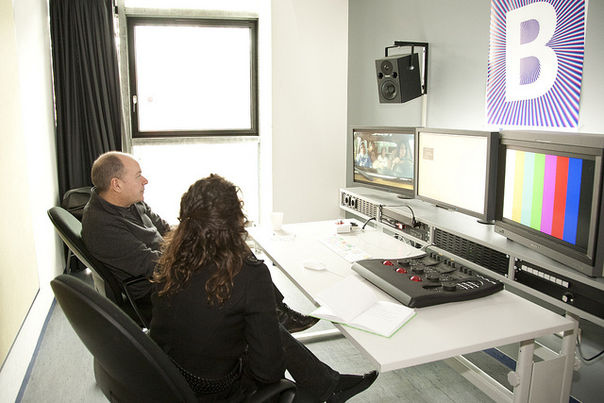Working in the Shadows
An interview with editor Andrew Bird, a mentor at the Campus Editing Studio who also edited the Berlinale Competition film THE FUTURE.

Andrew Bird working with a Talent at the Campus Editing Studio
Andrew Bird is an English film editor based in Hamburg who has worked with filmmaker Fatih Akin since his first short. Recently he edited Miranda July’s Berlinale Competition film THE FUTURE, and he’s a mentor of the Campus Editing Studio in which he helps editors and directors from all over the world to complete their unfinished projects.
Some people call editing “the art of the guillotine.” Do you feel pleasure in “guillotinating” footage?
No, I feel pleasure in putting things together, creating things.
Is there a rule of thumb you tell the Talents you supervise?
Probably the only rule that I think is relevant is: if you have an idea that you think might work, try it out. Never say: “This idea won’t work.” Even if it results in a bad idea. Sometimes the good ideas are very close to the bad ideas. I mean, maybe it’s good to go through the bad ideas, to get to the good ideas.
You’ve been working with Fatih Akin since he started his career. How is your working relationship with him?
It’s good because we’ve been together for so long. I know what he likes and vice-versa, so it’s funny because we don’t need to talk anymore, we just grunt.
And who has the final cut?
The director is the one who will have to live with the film for the rest of his life, with his name on it. But I never really experienced the situation in the editing room where my opinion and the director’s opinion were completely opposite. We discuss things all the time, we talk things through. If I believe something should be one way, I will try to persuade him for as long as I can. If I passionately believe in it, I will persuade him, and similarly, I’m disposed to be persuaded.
Have you ever gotten into heated arguments with directors?
Of course, it’s part of the process. You’re working with emotions, the room is small, you’re sitting very close to each other, you spend a lot of time together. Emotions come out.
Has your work ever been altered by producers?
Certainly you’ll get a lot of stories from America about that, but it doesn’t happen so much in Europe. I think you generally work with directors who have the final cut. Producers may put pressure on a director to finish. But I don’t think I’ve ever had a producer coming and saying: “Change it.”
Which editors do you admire?
Every one of them, every single one of them. I think they’re not in the limelight at all, but always in the shadows. They contribute such a large part to making films, and their contribution is never seen as much as the director’s or the cinematographer’s. Perhaps we should be called “director of montage” or something like that.


301 Moved Permanently